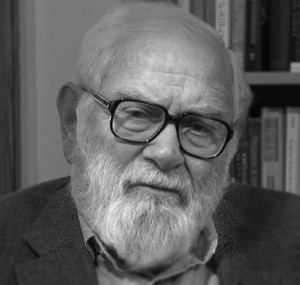Humanist Remembrance: Carl Coon, 1927-2018

“Our country is in trouble. It’s like a snake that has outgrown its skin and is trying to shed it. We’ve gotten too big and complicated and diverse to be labeled a Christian nation. Humanism fits the emerging need. Let’s make it happen.”
—CARL COON, accepting the 2013 AHA Lifetime Achievement Award
Carl Coon was born on April 27, 1927, in Paris, France, the first of Mary Coon and Carleton Coon Sr.’s two sons. His father was an accomplished anthropologist whose work in the Middle East, Asia, and North Africa influenced his son Carl’s wanderlust and affinity for immersing himself in foreign cultures. In 1939, when Coon Sr. was on sabbatical from Harvard University, a six-month family trip to Morocco and the Azores of Portugal proved impressionable for twelve-year-old Carl, as did visiting his father’s digs in Tangier and Palmyra, Syria.
Carl was drafted into the US Army near the end of World War II. He was still in basic training in Germany when the war ended, and he spent the next year there before returning to the United States to attend Harvard. He graduated in 1949 with a degree in geography and got married a week later. In August Coon was accepted into the Foreign Service. He worked for the State Department for nearly four decades, with diplomatic posts in the Middle East and South Asia, as well assignments in Washington, DC.
He had six children with his first wife, Janet Wulsin, who died of cancer in 1967. In 1968, Coon married fellow Foreign Service officer Jane Abell, who was forced to retire due to a State Department rule at the time barring female Foreign Service officers from marrying. She returned to diplomatic work later on and in 1981 both were named US ambassadors, Carl to Nepal and Jane to Bangladesh. They both finished their terms in 1984.
After retiring in 1985, Coon pursued his love of classical music and composed a number of works, mostly chamber and piano. He cultivated a longtime interest in human evolution and the human condition, writing several books, including Culture Wars and the Global Village: A Diplomat’s Perspective (2000) and One Planet, One People, Beyond “Us versus Them” (2004), in which he espoused the critical need for humanity to see itself as a single group in order to deal with global challenges. A prolific essayist, Coon put forth many ideas on his website, ProgressiveHumanism.com, inspiring responses from humanists around the world.
In 2004, Coon was elected to the board of directors of the American Humanist Association and shortly after was named vice president, a position he held for five years. In 2013 he was honored with the AHA’s Lifetime Achievement Award. Accepting it at the annual conference, Coon remarked that humanists “should look for coalitions at least as much as we seek conversions,” noting that:
mass movements of the past have had to choose, at one time or another, between ideological purity and the big tent approach. The ones obsessed with doctrine tend to break up over doctrinal disputes. We don’t need that. I’m all for pluralism and the big tent.
Coon wrote numerous reviews and essays for the Humanist, his challenges to fellow humanists coursing with a robust vitality as well as a playfulness that communicated his overriding affection for humanity. His last presentation to AHA members was at the 2017 conference, in which he urged the organization to shift its priorities to focus on advocating for climate action.
In October 2018 Coon published an autobiography, People of Earth: The First Forty, covering roughly the first half of his life. In a 2017 blog entry that would later be incorporated into People of Earth he wrote:
I see patterns in my trip reports that are congruent in interesting ways to patterns I also sense in my diplomatic experiences, and in my family travails, and even in the music I have carried around in my head and occasionally composed. There may be a kind of unity in all this diversity. What is taking shape in my mind is a more rounded and detailed appreciation of the life that exists on this extraordinary planet of ours, and humanity as an exceptional part of it, and humanism as an emergent world view whose time has come.
Carl Coon died on December 3, 2018, at the age of ninety-one.
